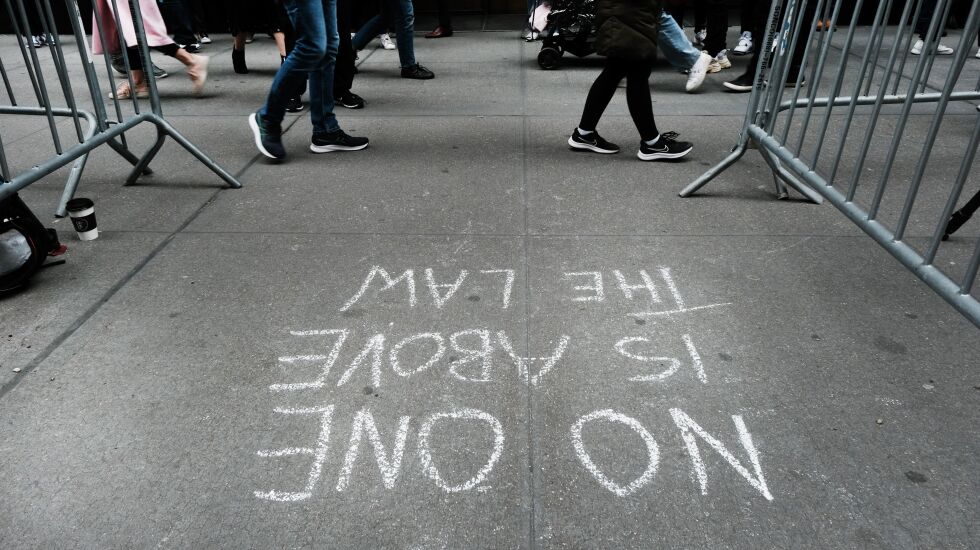
This is a time in history for America to live up to its ideals. The United States undeniably stands at a pivotal moment. A former president has been indicted for the first time.
Everyone involved in the legal proceeding in New York, where a grand jury returned the indictment, as well as in additional indictments that may occur, should ensure everything is done in a way that creates a model of fair-minded jurisprudence for the future.
By his alleged actions, former President Donald Trump has forced prosecutors into a difficult but unavoidable choice: By not indicting, do they send the message that presidents are above the law? Trump himself has asserted that he is. Or by bringing charges, do they further divide the nation and pave the way for political opponents to beset future presidents with spurious legal cases?
Yet the difficulty of the decision is no reason to give Trump an unwarranted pass. As with any other citizen, Trump should be called to account for his actions.
To put things in perspective, we look back at how Peter Rodino, the little-remembered chairman of the Watergate-era House Judiciary Committee, worked assiduously to set an example of balance and fair-mindedness as he led the investigation into the articles of impeachment against then-President Richard M. Nixon. When the first article was announced, Rodino called his wife and said, “I pray that we did the right thing.”
What a fine example for those tasked with bringing the allegations swirling around Trump to a just conclusion. Rodino’s effort to build an impartial record is one that should be a universal guide, not just for those involved in the criminal justice system but also for those who speak out publicly about Trump.
The bedrock issues involving Trump are not just a matter of the indictment Manhattan District Attorney Alvin Bragg brought on Thursday. Other charges may be brought by Fulton County District Attorney Fani Willis in Georgia over Trump’s alleged effort to overturn the 2020 election and by Special Counsel Jack Smith, who is investigating alleged mishandling of classified records and the Jan. 6 assault on the U.S. Capitol.
Taken together, these are enormously significant allegations that strike at the foundation of democracy. Should Trump have prevailed in his effort to overturn the 2020 presidential vote, the outcome of future elections would rest not with the voters, but with those best able to rig the system. Should it be proved that Trump’s efforts were rooted in illegality on his part, that cannot be taken lightly.
The charges in New York worry some who view the case as built on a novel legal theory. At this writing, the indictment has yet to be unveiled. Reportedly, Trump faces more than 30 counts related to business fraud as well as concealing payments to porn-film star Stormy Daniels before the 2016 election.
But it would be equally troubling should Trump brazenly escape the even-handed application of justice. That could set the stage for future presidents to see themselves as above the law. Some political observers wonder if former President Gerald Ford’s decision to pardon Nixon, though supported by many as a way to move beyond Watergate, led Trump to think he never would be called to justice, no matter what he did.
As a nation confronting these questions, we must decide whether our commitment to law emerges as a stronger beacon for a world hungry for justice — or as a tattered shell struggling to stay afloat, victim to the unscrupulous and the conniving.
The contrast between Trump’s lifelong pushing of legal limits — he is also at the heart of numerous civil lawsuits — and recent stories about former President Jimmy Carter’s admirable rectitude could not be more stark. Trump never intended to shine as a president who was above even the appearance of impropriety.
No action taken by prosecutors will be roundly applauded in a nation as politically polarized as the United States is today. To no one’s surprise, Trump’s political allies are already criticizing the indictment as a weaponization of the criminal justice system, even before we learn all the underlying facts.
What’s important is how this historic movement into unprecedented and consequential political and legal waters appears to clear-thinking observers, now and in the future, and how it shapes how politicians view their legal guardrails.
We welcome letters to the editor and op-eds. Check out our guidelines for both.
Send letters to letters@suntimes.com







